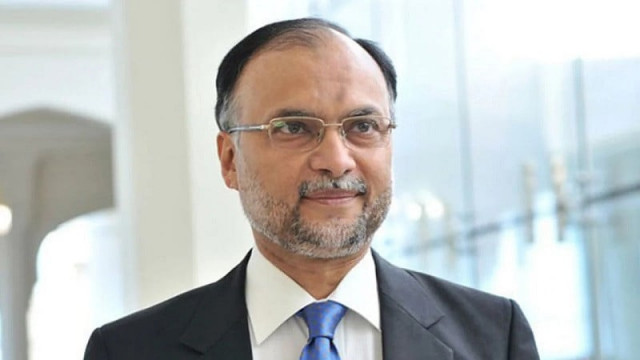Islamabad:
Planning Minister Ahsan Iqbal said on Thursday that Prime Minister Shehbaz Sharif has been a commission of inquiry to take litigation against those responsible for the collapse of the tunnel at RS500 billion Neelum-Jhelum Hydropower Project (NJHP).
In a press conference, Iqbal said the Commission, led by a retired judge, was formed on the basis of conclusions from two separate committees. He added that the Commission will hear those involved before embarking on litigation.
Under the Terms of Terms), the Commission will recommend legal, administrative and financial actions against those responsible. It will categorize responsibility as gross negligence, procedural mismatch or potentially criminal liability, as it may be, reads a review.
Iqbal called NJHP’s failure a “expensive and shiny error”. He said the restoration of the 969 Megawatts project, which has been closed since May last year, was still not in sight when Water and Power Development Authority (WAPDA) had not yet submitted PC-I for the revival.
In May this year, water resources had minister Muhammad Moeen informed the National Assembly that the restoration process for NJHRP was expected to take another two years to implement.
A few months ago, WAPDA had proposed the government that either the tunnel should be rebuilt with an estimated cost of RS250-300 billion or to be repaired by spending around RS20 billion. The government had also engaged an international panel of experts (IPOE) to investigate the structural issues that affect the project’s Head Race Tunnel (HRT).
The panel was tasked with identifying the causes of recent challenges. The report highlighted areas of the tunnel floor that required attention along with recommendations for improved ventilation, lighting and workers’ safety measures.
In May of this year, the federal cabinet approved to establish a study of the Investigation Commission under the Pakistan Commission for the 2017 Investigation Act to investigate NJHP.
Justice (RETD) Tariq Abbasi is chairman of the Investigative Commission, which has time for August 20 to end his report, according to the announcement. Other members include Shahid Khan and the secretaries of the establishment department, the Water Resources Division and Engineer-in-Chief of Pak Army.
The Commission’s Thor involves a sequential analysis of all key decisions in planning, design, execution and monitoring; Establishing clear responsibility for omissions, delays and erroneous assessments that led to the collapse of the tunnel.
The Commission has been tasked with verifying compliance with engineering standards, project management protocols and directives from the Executive Committee of National Economic Council (ECNEC) and Central Development Working Party (CDWP) and other regulatory bodies.
It is required to identify the responsible individuals and determine whether errors in geological assessments, tunnel lining and water pressure management were due to negligence, incompetence or deliberate mismatch that connects specific lapse to responsible officials.
The Commission assesses the role of supervisory bodies, consultants and contractors to identify errors in risk limitation, contractual obligations or misleading insurance and establish liability accordingly.
At the press conference, Iqbal also talked about the prevailing financial conditions and the results of this government in the last year. He said the government successfully brought inflation down to an average of 4.5% – the lowest since 2016.
“Effective fiscal consolidation and external sector stability emphasize Pakistan’s stronger than expected recovery track, he said, adding that economic performance reflected cautious economic management and signals growing confidence in Pakistan’s ability to navigate external shocks and maintain a path to stability and inclusive growth.
To a matter of the government’s inability to meet investment target, the minister said investors were concerned about Pakistan’s macroeconomic stability and legal challenges. He added that after bringing political and financial stability and making constitutional changes through the 26th amendment, investors’ trust has been restored. He expressed hope that the foreign investments would begin to gain from this financial year.
Pakistan’s macroeconomic performance in FY2025 demonstrated resilience despite global headwinds, with GDP growth increasing to 2.7% and inflation dropped sharply to an average of 4.5%, the development update report reads that the Ministry of Planning was released on Thursday.
It added that the government’s strategic focus on projects with great influence, inclusive and export leaders under PSDP matches “Uraan Pakistan” priorities that emphasize export, digitalization, green growth, energy security and social equity.



